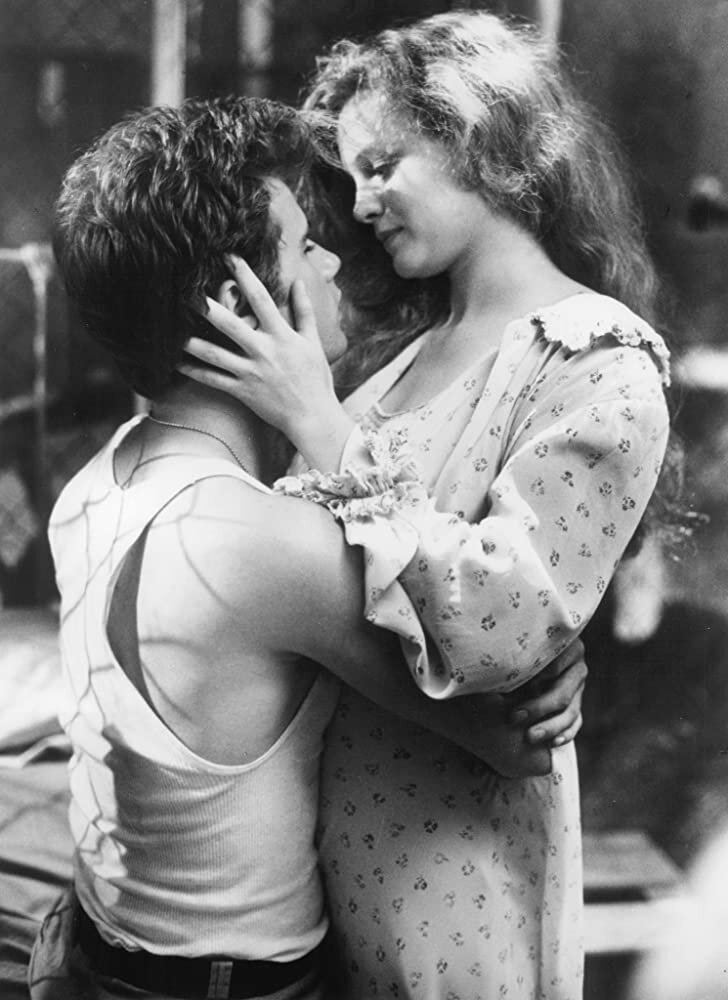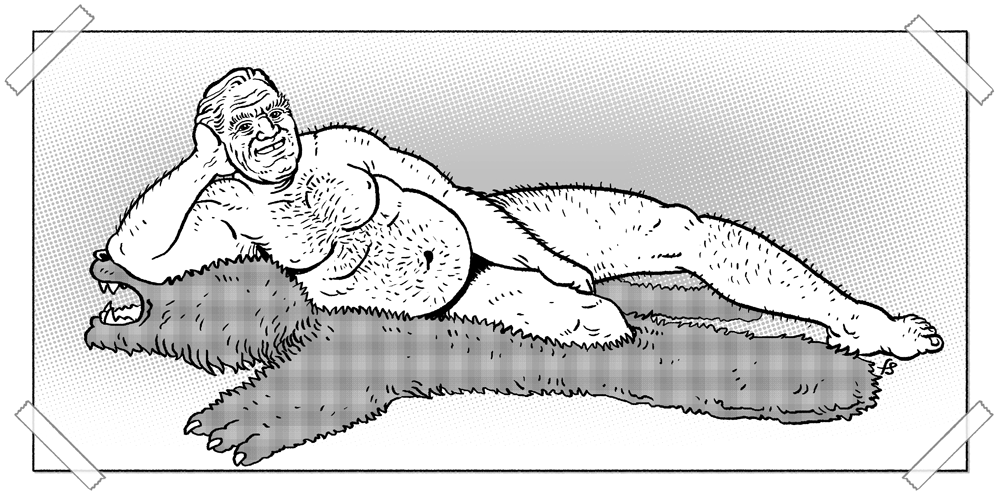The Travolta/Cage Project #34 Shout (1991)
The wonderfully ridiculous 1991 inspirational teacher drama Shout functions as the concluding entry in the little known, little-loved “John Travolta saves the children” trilogy. This George H.W Bush-era trio of understandably forgotten vehicles began with Travolta’s saintly white social worker saving an adorable moppet played by Blossom’s Joey Lawrence from an evil Hispanic drug lord in 1990’s Chains of Gold. He followed it up a year later with the feeble one-two punch of 1991’s Eyes of an Angel and Shout.
Eyes of an Angel found Travolta’s hard-luck single dad trying to save his doe-eyed daughter from an evil Hispanic crime lord and his own spectacular gift for self-sabotage while in Shout Travolta plays a charismatic music teacher with a dark secret and an infectious enthusiasm for a newfangled form of music known as “rock and roll.”
Like Eyes of an Angel and Chains of Gold, Shout is racially charged but where Travolta’s earlier vehicles were casually and not so casually racist in their depiction of beautiful, vulnerable white children being menaced by non-white heavies downright Satanic in their evil Shout goes so far out of its way to depict black culture in a flattering light that it ends up robbing its black characters of their voice, agency and humanity.
With the exception of sexy, unseen DJ Midnight Rider, the black people in Shout don’t talk. They don’t have names or families or character arcs or motivations. Instead they exist as sherpas of cool whose sole function is to introduce white juvenile delinquents to an intoxicating black world of rock and roll and sex and sweat and attitude and violence.
Shout is an embarrassingly sincere love letter to the liberating, intoxicating and horny-making power of black music whose only black character is the never-seen outlaw DJ voiced by James Avery, The Fresh Prince of Bel Air’s Uncle Phil whose sonorous purr and sexy, swaggering poetry sends listeners’ libidos into overdrive.
In yet another enjoyably hammy star turn, Travolta cranks the charisma up to 11 as Jack Cabe, a harmonica-playing, rock and roll-loving music teacher who gets a job at the Benedict Boys Home, a Southern-fried purgatory for wayward youths overseen by the titular Eugene Benedict (Richard Jordan).
The boys at the home spend their days engaging in intensely homoerotic exercise and punishment until Eugene’s gorgeous daughter Sara (Heather Graham) moves back home. Bad boy Jesse Tucker (James Walters, who would later score a number one hit with “How Do You Talk To an Angel” as the frontman for make-pretend TV band The Heights) announces his intention to seduce the fetching young beauty. His exact words on the matter are, “I’m gonna nail her. I’m gonna light up Benedict’s precious little daughter like a pinball machine.”
Jesse ratchets the ickiness up a notch by then betting his housemates that he’ll have sex with the headmaster’s daughter. This is supposed to establish that Jesse is an incorrigible bad boy who fucks and needs to be tamed by the right woman.
Jesse is supposed to be James Dean with a guitar; instead he just comes off as a douchebag with an exceedingly punchable face. Yes, Jesse is a bad, bad boy whose life changes forever when he hears snatches of music on Jack’s radio that’s different from anything he’s ever encountered.
In words rife with clumsy historical irony Travolta’s rock and roll evangelist tells his ecstatic pupils of the revolutionary sounds they just heard, “It’s called rock and roll, boys! Only a select few know about this right now but I tell you something: in the not too distant future, it is going to burn through this country like a prairie fire!”
I like to think that there is a draft of the script where Travolta goes on like this for some time, specifying, for example, “Like, there’s gonna be this nerdy looking dude with glasses and he’s gonna be a kid, barely out of his teens, but he is going to write some amazing music before something bad happens to him, I dunno, maybe a bad plane crash with a bunch of other top musicians. And there’ll probably be a super-sexy white guy who sings like a black man and shakes his hips in a rhythmic, hypnotic fashion that will prove both seductive and threatening. And then, about ten years from now a bunch of bands from England are going to become real popular in the States, with shaggy haircuts and infectious tunes. Of course psychedelic drug use is going to have a huge impact on rock and roll in the mid to late 1960s. But perhaps I have said too much.”
In moments like these, Travolta’s rock and roll true believer comes off less like an unusually hip, knowledgable 1955 outlaw than a time traveler from the year 1991 who knows ALL about a form of music that is ostensibly only a few months old because he has access to VH-1 documentaries and every issue of Rolling Stone and Creem and everything Griel Marcus has ever written.
Travolta is every bit as much of a gleeful anachronism as the perversely contemporary, Southern Californian legendary 19th century Canadian rower Nicolas Cage played in The Boy in Blue. Travolta is so ridiculously anachronistic that he might as well play his amazed pupils/acolytes a Pixies CD on a boombox or break into a freestyle rap to inspire his students.
Jesse isn’t the only juvenile delinquent whose life is instantly and dramatically transformed, for the better, by his exposure to rock and roll. Under the charismatic stranger’s tutelage, the entire Benedict Boys Home band falls under the sway of rock. In a stunning, literally unbelievable turn of events, the Benedict Boys Home musicians hear a few rock and roll songs on the radio and instantly become proficient playing a style of music that’s literally only a few months old.
It would be like if I made a movie where a character is exposed for the first time to rap music in 1980 New York and literally a week later that character is heading into the studio to record their critically-acclaimed, award-winning self-produced rap debut, having somehow become highly skilled in a challenging new art-form over a matter of days.
In Shout, rock and roll is not a form of music you need to work hard to get good at, let alone master. It’s a liberating black (but not too black) spirit you feel deep down in your souls and sets you free, liberating you forever from the white-bread tyranny of rules and propriety and repression with its earthy black sensuality.
This helps explain why Shout does not bother with even a single “getting better at music” montage sequence. In its fairy tale world, rock isn’t something you need to practice or perfect: it’s something that pours out of you organically. If you’re passionate about black music here, then that passion INSTANTLY translates into prodigious talent.
The inspirational teacher with the Bruce Willis-level harmonica skills teaches the boys all manner of important life lessons about the life-saving power of black music and the intimidating coolness of black people, mostly off the clock. The boys’ education really kicks into high gear when they sneak into a juke joint full of beautiful black extras dancing and singing and sweating and cranking out that sweet, sweet rock and roll.
This proves the ultimate test. The white boys pass it with flying colors. The home’s guitar man is good enough to sit in with a group of adult black musicians I can only imagine are overjoyed at getting to perform with a white teenager while his housemates are “down” enough to fit in with the coolest scene in human history.
Jack’s ease and familiarity with black culture, black music and black people are seen as badges of purity and authenticity. He’s realer than everyone else because he not only plays black music and hangs out with black people—it turns out his dark secret is that he killed a dude protecting a black man from a white attacker.
Travolta is introduced drinking a beer, smoking a cigarette and cranking some of that sweet, sweet rock and roll music on a jukebox before he’s challenged by a redneck racist who taunts, “You’re not from around here, are you, boy?”
The racist turns out to be the sheriff, who does not take kindly to this handsome stranger pursuing his ex. This sets the stage for our hero to get arrested at a big Fourth of July concert where his students shock the squares by playing rock and roll in tribute to their mentor instead of the soulless white nonsense they’re supposed to play.
If I might damn it with the very faintest of praise, Shout represents the apex of Travolta’s “Save the children” trilogy if only because it’s spirited and corny and looks great and boasts a hammily entertaining performance from Travolta, who is clearly having a blast realizing his most outsized inspirational teacher fantasies.
It certainly does not hurt that Shout clocks in at under 90 minutes. True, I found myself laughing at Shout rather than with it but at this point I will take entertainment any way I can get it, particularly where Mr. Travolta is concerned.
At this stage in the grand Travolta/Cage experiment I have learned through experience to lower my expectations for Travolta’s movies, which are often quite poor, and raise my expectations for Cage’s cinematic canon.
Shout is a valentine to black music perversely devoid of actual black characters. I’d like to think we’ve evolved past that in the nearly three decades since Shout was made and instantly forgotten but I’m not sure that’s the case.
We still have a regrettable tendency to try to tell black stories through the experiences and epiphanies of white people but hopefully we’re not quite as cavalier about pushing black characters out of the frame or into the background to make more room for white people and their ostensibly more relatable problems.
Support Nathan Rabin's Happy Place at https://www.patreon.com/nathanrabinshappyplace
BUY the 500 page Ridiculously Self-Indulgent, Ill-Advised Vanity Edition of The Weird Accordion to Al, with over 120 pages of new material on UHF, The Compleat Al, The Weird Al Show and more over at https://www.nathanrabin.com/shop







